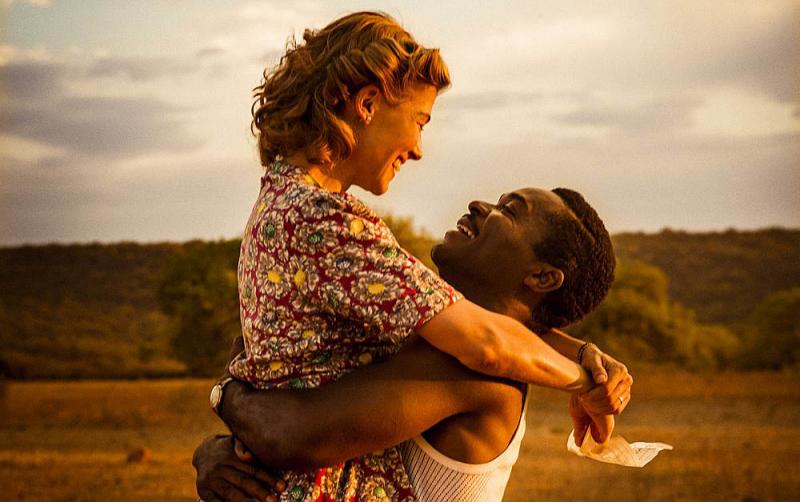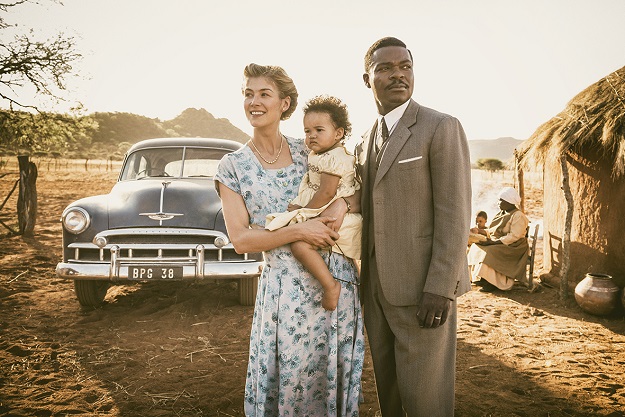A United Kingdom | reviews, news & interviews
A United Kingdom
A United Kingdom
Love, race and power politics under African skies

It's remarkable that the story of Seretse Khama, the king of Bechuanaland, isn't more popularly known, though Amma Asante's film may change all that. The movie opens in a smoggy, gloomy London in 1947, where Seretse (David Oyelowo) is completing his studies in law prior to returning to rule his homeland. Momentous change is in the air in the post-war world, as Europe struggles to rebuild and Indian independence signals sundown on the British Empire.
Seretse encounters filing clerk Ruth Williams (Rosamund Pike) at a London Missionary Society dance, where their eyes meet across a crowded room. With remarkably little preamble or soul-searching from the protagonists, not only romance ensues, but nuptials.
Getting 'A United Kingdom' made has been a labour of love for David Oyelowo
A mixed-race marriage in 1940s London must have been controversial enough, but in the southern half of Africa, as South Africa introduced its apartheid laws, it was dynamite. It's hard to believe that Seretse didn't anticipate the storm that was about to break over the couple's heads, both from the British colonial authorities and also from his outraged uncle (and acting regent in Bechuanaland) Tshekedi (Vusi Kunene). As Asante and screenwriter Guy Hibbert show us here, huge political pressure was heaped on the couple from South Africa, the British government and Seretse's own people, and it was only after years of exile that he was able to return to Bechuanaland to become Prime Minister of what is now Botswana.
Getting A United Kingdom made has been a labour of love for Oyelowo, and the story's David-and-Goliath aspect and mix of power, politics and race give it blockbuster potential. It's a shame, then, that it suffers from some painfully simplistic characterisation. Seretse and Ruth's relationship is presented as an idyllic romance amidst Out of Africa-style scenes under sunny southern skies, but while we see Ruth looking bored doing her fusty Dickensian office job, we never fully understand what drove her to give everything up for a new life in a very primitive Third World country. The fact that the couple have to spend large chunks of time living on separate continents doesn't help to bind the narrative together.
Meanwhile, it's open season on the British establishment. Okay, everybody hates the snobby racist Brits and their imperial pretensions, but Jack Davenport's sneering, patronising Sir Alistair Canning, HMG's man in southern Africa, makes Flashman from Tom Brown's Schooldays look like Gandhi, while the English colonial wives resemble Penelope Keith's Margot Leadbetter on steroids and pink gin (intriguingly, Oyelowo's wife Jessica plays Canning's snooty wife, Lady Lily). Even Ruth Williams's drab, disapproving father (Nicholas Lyndhurst) resembles a closet Hitler impersonator.
 In a different film altogether, more could have been made out of the political brouhaha the Seretse case aroused back in London, where we see a posse of crusading MPs (including Tony Benn) campaigning on Seretse's behalf, while Labour Prime Minister Clement Attlee (Anton Lesser) succumbed to South African threats to cut off gold and uranium supplies. Meanwhile Winston Churchill played a cynical game of backing Seretse while in opposition, then dropping him when he got re-elected.
In a different film altogether, more could have been made out of the political brouhaha the Seretse case aroused back in London, where we see a posse of crusading MPs (including Tony Benn) campaigning on Seretse's behalf, while Labour Prime Minister Clement Attlee (Anton Lesser) succumbed to South African threats to cut off gold and uranium supplies. Meanwhile Winston Churchill played a cynical game of backing Seretse while in opposition, then dropping him when he got re-elected.
All the while, the handsome Seretse is the acme of politeness, wisdom and decency, and speaks much better English than the oafish colonials. Obviously the real Seretse must have been an extraordinary man, and his gambit of renouncing his royal status in favour of democratic elections was masterly, but even he must have had the occasional off day. Nonetheless, it's an amazing real-life tale, and the brutal realpolitik underpinning it still carries powerful resonance today.
 THE BEST OF ROSAMUND PIKE
THE BEST OF ROSAMUND PIKE
Barney's Version. Pike plays the third wife as novelist Mordecai Richler makes a mostly welcome return to the screen
Gone Girl. Pike compels in unfilmable book triumphantly brought to the screen by David Fincher
Jack Reacher. Pike survives the famous curse of Cruise
Made in Dagenham. Pike almost steals a warm-hearted comedy about ladies striking for equal pay
Women in Love. A BBC Four adaptation starring Pike and Rachael Stirling does not get over The Rainbow
PLUS ONE TURKEY
Thunderbirds Are Go. Pike voicing Lady Penelope cannot save the day for ITV reboot
The future of Arts Journalism
You can stop theartsdesk.com closing!
We urgently need financing to survive. Our fundraising drive has thus far raised £49,000 but we need to reach £100,000 or we will be forced to close. Please contribute here: https://gofund.me/c3f6033d
And if you can forward this information to anyone who might assist, we’d be grateful.

Subscribe to theartsdesk.com
Thank you for continuing to read our work on theartsdesk.com. For unlimited access to every article in its entirety, including our archive of more than 15,000 pieces, we're asking for £5 per month or £40 per year. We feel it's a very good deal, and hope you do too.
To take a subscription now simply click here.
And if you're looking for that extra gift for a friend or family member, why not treat them to a theartsdesk.com gift subscription?
more Film
 theartsdesk Q&A: actor Sam Riley on playing a washed-up loner in the thriller 'Islands'
The actor discusses his love of self-destructive characters and the problem with fame
theartsdesk Q&A: actor Sam Riley on playing a washed-up loner in the thriller 'Islands'
The actor discusses his love of self-destructive characters and the problem with fame
 Honey Don’t! review - film noir in the bright sun
A Coen brother with a blood-simple gumshoe caper
Honey Don’t! review - film noir in the bright sun
A Coen brother with a blood-simple gumshoe caper
 The Courageous review - Ophélia Kolb excels as a single mother on the edge
Jasmin Gordon's directorial debut features strong performances but leaves too much unexplained
The Courageous review - Ophélia Kolb excels as a single mother on the edge
Jasmin Gordon's directorial debut features strong performances but leaves too much unexplained
 Blu-ray: The Graduate
Post #MeToo, can Mike Nichols' second feature still lay claim to Classic Film status?
Blu-ray: The Graduate
Post #MeToo, can Mike Nichols' second feature still lay claim to Classic Film status?
 Little Trouble Girls review - masterful debut breathes new life into a girl's sexual awakening
Urska Dukic's study of a confused Catholic teenager is exquisitely realised
Little Trouble Girls review - masterful debut breathes new life into a girl's sexual awakening
Urska Dukic's study of a confused Catholic teenager is exquisitely realised
 Young Mothers review - the Dardennes explore teenage motherhood in compelling drama
Life after birth: five young mothers in Liège struggle to provide for their babies
Young Mothers review - the Dardennes explore teenage motherhood in compelling drama
Life after birth: five young mothers in Liège struggle to provide for their babies
 Blu-ray: Finis Terrae
Bleak but compelling semi-documentary, filmed on location in Brittany
Blu-ray: Finis Terrae
Bleak but compelling semi-documentary, filmed on location in Brittany
 Oslo Stories Trilogy: Sex review - sexual identity slips, hurts and heals
A quietly visionary series concludes with two chimney sweeps' awkward sexual liberation
Oslo Stories Trilogy: Sex review - sexual identity slips, hurts and heals
A quietly visionary series concludes with two chimney sweeps' awkward sexual liberation
 Sorry, Baby review - the healing power of friendship in the aftermath of sexual assault
Eva Victor writes, directs and stars in their endearing debut feature
Sorry, Baby review - the healing power of friendship in the aftermath of sexual assault
Eva Victor writes, directs and stars in their endearing debut feature
 Blu-ray: Who Wants to Kill Jessie?
Fast-paced and visually inventive Czech comedy
Blu-ray: Who Wants to Kill Jessie?
Fast-paced and visually inventive Czech comedy
 Oslo Stories Trilogy: Love review - freed love
Gay cruising offers straight female lessons in a heady ode to urban connection
Oslo Stories Trilogy: Love review - freed love
Gay cruising offers straight female lessons in a heady ode to urban connection

Add comment